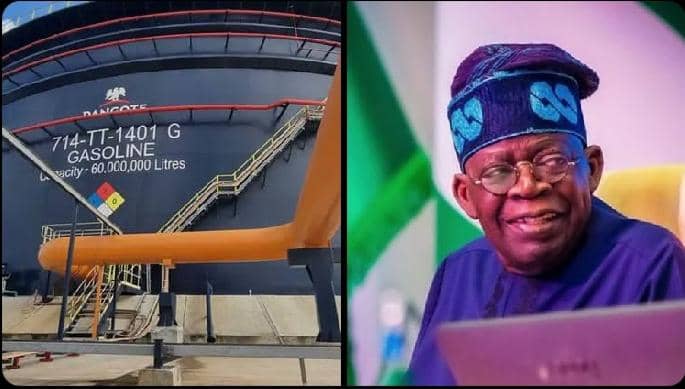The Dangote Refinery, hailed by President Bola Tinubu as a phenomenal project, stands as a monumental achievement in Nigeria’s quest for industrial and economic self-sufficiency. Located in the Lekki Free Zone near Lagos, this $19 billion facility is Africa’s largest oil refinery and one of the world’s largest single-train refineries, boasting a processing capacity of 650,000 barrels per day (bpd). Spearheaded by Aliko Dangote, Africa’s richest man, the refinery aims to address Nigeria’s chronic reliance on imported petroleum products, a paradox for a nation that is one of Africa’s top crude oil producers.
Conceived in 2013 and commissioned in May 2023, the refinery represents a bold step toward transforming Nigeria’s energy landscape. It is designed to process a variety of crude grades, including Nigerian and other African crudes, to produce Euro-V compliant fuels such as gasoline, diesel, kerosene, and aviation fuel. With the potential to meet 100% of Nigeria’s refined petroleum product demand and generate surplus for export, the project is poised to save billions in foreign exchange previously spent on imports.
The refinery’s integrated infrastructure sets it apart as a marvel of modern engineering. It includes a 435-megawatt power plant, a deep-sea port capable of handling very large crude carriers, and a fertilizer plant that has already begun exporting urea globally. These components enhance operational efficiency and position the refinery as a self-sustaining industrial hub, creating thousands of direct and indirect jobs for Nigerians.
Economically, the Dangote Refinery is a catalyst for growth, fostering backward and forward linkages in Nigeria’s economy. By refining crude locally, it reduces the need for imported fuel, which has historically strained Nigeria’s foreign reserves. The surplus production is expected to generate export revenues, strengthen the naira, and stimulate ancillary industries such as petrochemicals, transportation, and logistics.
Despite its promise, the refinery has faced significant challenges that have tempered optimism. Crude supply shortages, driven by Nigeria’s underperforming upstream sector and obligations to international oil companies, have forced Dangote to import crude from as far as the United States and Brazil. Regulatory disputes with the Nigerian Midstream and Downstream Petroleum Regulatory Authority (NMDPRA) over product quality and monopoly concerns have also sparked public debates about the project’s readiness and impact.
Critics argue that the refinery’s benefits, such as lower fuel prices, have yet to materialize for ordinary Nigerians. Persistent fuel scarcity and high pump prices in 2024 and early 2025 have fueled skepticism about the project’s ability to deliver immediate relief. Some analysts point to systemic issues, including Nigeria’s subsidy regime and distribution bottlenecks, as barriers to translating the refinery’s output into tangible consumer benefits.
Supporters, however, view these challenges as teething problems typical of a project of this scale. They emphasize the long-term potential for the refinery to reshape Nigeria’s economy by reducing import dependency, boosting industrial output, and positioning the country as a refining hub for West Africa. The refinery’s ability to produce polypropylene and other petrochemicals could also spur manufacturing and reduce reliance on imported plastics and chemicals.
The Dangote Refinery’s strategic importance extends beyond economics to national pride and sovereignty. For decades, Nigeria’s inability to refine its crude locally has been a symbol of underdevelopment, with the country exporting raw materials only to import finished products at a premium. By reversing this trend, the refinery embodies a vision of self-reliance that resonates with President Tinubu’s “Renewed Hope” agenda.
Government support has been critical to the project’s progress, with incentives such as tax breaks, land allocation, and infrastructure development in the Lekki Free Zone. However, tensions between Dangote Industries and state institutions highlight the need for clearer policy frameworks to balance private sector ambition with public interest. Resolving crude supply issues, for instance, requires coordination between the Nigerian National Petroleum Company Limited (NNPCL), international oil companies, and independent producers.
On the global stage, the refinery enhances Nigeria’s geopolitical influence by positioning it as a key player in the African energy market. Its export potential aligns with the African Continental Free Trade Area (AfCFTA) goals, enabling Nigeria to supply refined products to neighboring countries and reduce the continent’s dependence on European and Asian refineries. This could foster regional integration and economic diversification across West Africa.
The environmental implications of the refinery are a subject of ongoing scrutiny. While its Euro-V compliant fuels promise cleaner emissions compared to imported products, the sheer scale of its operations raises concerns about carbon footprints and local ecological impacts. Dangote Industries has pledged adherence to global environmental standards, but stakeholders continue to monitor compliance in the Lekki area.
Socially, the refinery has transformed the Lekki Free Zone into a bustling economic corridor, attracting investment and creating opportunities for local communities. Training programs for young Nigerians in technical and managerial roles underscore the project’s commitment to capacity building. Yet, community expectations for jobs and infrastructure development remain high, requiring careful management to avoid social unrest.
Looking ahead, the refinery’s success hinges on addressing operational and policy challenges while sustaining public and investor confidence. Scaling up domestic crude supply, streamlining distribution networks, and ensuring competitive pricing will be critical to maximizing its impact. If these hurdles are overcome, the refinery could serve as a blueprint for large-scale industrial projects across Africa.




